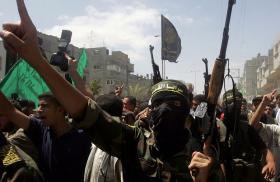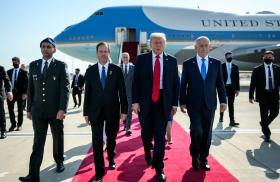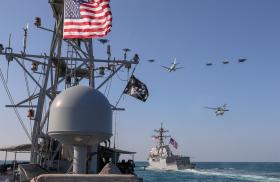What you see in Iraq is not necessarily reality. A useful early warning was the two soldiers standing on the Iraqi side of the Habur Gate border with Turkey. Their black berets were emblazoned with the metal insignia showing the Iraqi eagle and flag and they certainly looked like Saddam Hussein's soldiers. But they were, in fact, peshmerga fighters of the Kurdistan Democratic Party, the group which controls the crossing point.
My journey started in Ankara, with a group of five others from the think-tank The Washington Institute for Near East Policy. After discussing the official Turkish view, we flew to Diyarbakir in eastern Turkey from where we started a drive that would take us through Iraq, from north to south, five hundred miles or so, in ten days. It was perhaps not an 'essential journey' in terms of Foreign Office advice to travellers, unless you considered getting an on-the-ground perspective to be essential -- which we did.
Turkish officials refused to acknowledge the presence of Kurdistan Democratic Party fighters at the crossing point. They admitted only to having weekly meetings with an American colonel said to be in command there. He was invisible to us, as were most of the hundred thousand American troops plus other coalition forces stationed in Iraq.
As far as the majority of Iraqis are concerned, security is nominally in the hands of the new police service. Many checkpoints though are manned by men wearing little of the new blue uniform -- perhaps an armband or shirt. Who the other armed men are is anyone's guess. They are almost certainly linked to the local militias -- Kurdish in the north, Shi'a in the south. But whoever they were looking out for it was not a group of Americans and Europeans. I must have passed through scores of roadblocks but was never stopped once.
The atmosphere in Iraqi Kurdistan was friendly though cautious to events in the rest of the country. We wanted to speak to both the Kurdistan Democratic Party, headquartered in Erbil, and the rival Patriotic Union of Kurdistan, based in Suleimaniyah. The visit to Erbil was just five days before two suicide bombers killed more than a hundred people and injured many others.
Both Kurdish groups want to maintain the degree of autonomy theoretically granted to them by Saddam in the 1980s -- and cemented by the twelve years, post-1991, when Baghdad's writ did not stretch into Kurdistan. But this definition creeps close to federalism, the f-word that cannot be mentioned in debates about a future political structure.
The Kurds not only want to preserve what they have, but they also want gains. Kirkuk, the city at the centre of the northern oil fields, was Arabised under Saddam. Kurds who lost their homes want to move back. How big is 'Kurdistan'? The future will tell. But a map in my Suleimaniyah hotel showed it stretching well into the former Soviet Union, Iran and Turkey -- as well as across northern Syria to the Mediterranean. So much, perhaps, for the argument that Kurdistan is not viable because it would be land-locked!
From the beautiful, snow-capped Kurdistan hills we headed for Baghdad. A four-hour drive from Suleimaniyah, setting off at 4.45am, via the outskirts of Kirkuk. For Kurdistan watchers, the last Kurdish checkpoint was an hour south of there. As we approached Baghdad, some checkpoints also included American troops and the occasional tank. The capital, though run down, still has some traces of once being beautiful. There are cars everywhere. Anecdotal evidence suggests that their number has doubled in the last few months and are up by a factor of ten from a year ago.
Most of our meetings were inevitably in the 'Green Zone', the four square miles on the bulge of the left bank of the Tigris where Saddam and his Ba'athist regime was concentrated. Access is via US military roadblocks but British or American passports are just waved through. The headquarters of the Coalition Provisional Authority are in Saddam's old Republican Palace, which used to boast busts of his head until they were removed by cranes a few months ago.
Working for the Provisional Authority is hard. Long, long days. Unless duties require it, most people do not leave the Green Zone. They look incredulously on those, like my group, who were staying in a hotel outside the zone and on a trip organised by ourselves rather than the Provisional Authority or the military.
There is no doubt the security situation is different compared to the north. Armed guards and big gates at the hotels are there to prevent car bombs -- one of which damaged a hotel two days before our arrival -- and there is the occasional sound of unexplained gunfire. One night, just after a power cut at 11pm, there were a couple of sharp explosions. From the balcony overlooking the Tigris and the Green Zone beyond, I could smell the explosive. It turned out that a couple of rockets had been fired at the Provisional Authority but had fallen short, causing no damage.
The clear opinion of the range of senior Provisional Authority staff we met and discussed the situation with over a period of three days was that the task of reconstructing Iraq is difficult but has to succeed. Progress is being made, albeit slowly. Once the $18 billion approved by the US Congress starts coming through in the next few months, things will speed up. There is a dread of the paperwork that might be associated with this.
Depending on the diplomacy of those we spoke to, there was a less than believable understanding or outright puzzlement at having to work to a June 30 deadline, when sovereignty will be transferred to the selected Transitional National Assembly.
On two different nights we went to private houses to meet and have dinner with Shi'a clerics to try to understand the Sistani factor: the role being played by Grand Ayatollah Ali Sistani from his vantage point in the holy city of Najaf, south of Baghdad. One cleric cautioned us, saying Sistani wanted no role in politics but, as an ayatollah, had to give advice if asked. He argued that Sistani was effectively being manipulated by some of the Shi'a members on the Governing Council, who wanted to push the simple numerical advantage of the Shi'as -- 65 percent of the population -- in early elections.
Another cleric, whom John Le Carre might have described as being straight out of Tehran Centre, argued, implausibly, that the Shi'a were so grateful to American President George Bush for their liberation that they were prepared to accept an election delay. This would prevent Iraq becoming an issue in the US presidential campaign, he said, and ensure Bush's re-election, which they wanted.
From Baghdad we headed for Hillah, where the Provisional Authority South-Central supervises six provinces. Hillah is typical of much of southern Iraq. Winter rain, a high-water table and poor sewerage have made huge puddles, even lakes, in open areas. Coupled with no refuse collection, or a preference for slinging rubbish anywhere, the overall appearance is one of squalor. But Hillah is a partial success story. The local Shi'a cleric, supported by tribal leaders, is working with the Americans to build a sense of community.
The grandest building is the former Saddam mosque, a palatial structure completed just a few months before the invasion at a reported cost of $16 million. It was for the use of Saddam -- in case he ever came to Hillah -- rather than the local people. It is still a mosque but now open to all. Part of a huge washroom block has been converted into an internet caf. Spare capacity is used for a local radio station to counter Iranian broadcasts, as well as a room full of new computers to establish a translation service, making western books -- and ideas -- accessible to those whose only language is Arabic.
Countering Iranian infiltration is a daily grind. Shi'a politics are not monolithic and there is little apparent wish to import a system that has failed so dismally in Iran. But we were told several times that groups supported by Tehran use fear and intimidation to push their agendas.
Where the Americans run a province, organisations like the Badr Corps, the Shi'a militia trained by Iran, are not allowed to take over former Ba'ath regime buildings. When they try to seek a foothold, they are confronted and forced out. But down in Italian-controlled Nasiriyah, the scene of the widely reported rescue of US soldier Jessica Lynch, our hotel on the banks of the Euphrates was next to the police station -- which was next to the headquarters of the Badr Corps.
Iranian influence and that of other radical groups is also obvious in Basra, Iraq's second city, which, if the world was fair, could revert to outshining Kuwait City as a regional commercial and transport hub. British authorities have allowed different organisations squatters' rights in some of the once grand houses along the main boulevards. Officials fear that senior Iraqi police officials are too close to the Iranians.
An even more glaring example of Iranian games is that Iran does not allow patrols of the nascent Iraqi Riverine Patrol Service down the Shatt al-Arab waterway south of Basra. The Iranians shoot at them. So much apparently for the 1975 Algiers Agreement which enshrined the thalweg line -- the mid-point of the deepwater channel -- as the border.
The two principal dangers in Iraq, both for foreigners and Iraqis, are political violence and banditry. Even the road south from Basra to Kuwait is not, in British army parlance, 'a secure route'. Car jacking and robbery are dangers, especially at night. Political attacks are a combination of revenge and opportunism. The perpetrators are supporters of Saddam, said to be constantly going on to his interrogators about his place in history, and Islamic fighters.
The main political risk is that the wider Iraqi public, most of whom probably have an AK-47 hidden away somewhere, will lose faith in the developing political process, the tentative steps towards a constitution and local then national elections. Civil war? Not yet, but it remains a possibility.
The upside is that Iraq's post-Saddam tax-free economy is bringing in volumes of refrigerators and washing machines which, while adding to electricity supply problems, will quickly impact on people's well-being, particularly that of Iraqi women. And the reconstruction contracts will lead to a huge increase in jobs. The prediction is that within eighteen months Iraq will have to import labour. The question is, is there time?
Simon Henderson, a member of Chatham House Council until last year, is a London-based associate of The Washington Institute for Near East Policy and a biographer of Saddam Hussein.
World Today



